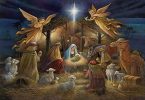5th Sunday of Easter (Year B)
Scripture: Acts 9:26-31; Ps. 22:26b-27, 28, 30, 31-32; 1 Jn. 3:18-24; Jn. 15:1-8
We Indians are facing one of the greatest challenges in our history. The COVID 19 pandemic has brought us to our knees. The hospitals are full. We are facing a shortage of medicine, vaccines, medical oxygen, etc. The crematoriums have long queues to cremate the deceased. The pictures in the media are horrifying. We hear every day our near and dear ones are getting affected by COVID. Our country clocking 3 lack 50 thousand infections in this week and more than three thousand people are dying.
As I look back, we are the same people who thought that we were self-sufficient and one of the superpowers in the world. We had overcome the first wave. Our scientists and researchers were some of the first to produce vaccines in the world. India was seen as the saviour for other countries in this pandemic. We had become complacent with our lives when the others were battling the second wave. Now we are blaming each other. Politicians are blaming the people for violation of rules. The people are blaming the leaders for their short vision. We are not here to blame anyone. We are here to draw a lesson for our lives.
India has plunged into the crises and we need help. It may be in the form of medicines, raw material for oxygen, oxygen cylinders, oxygen plants, vaccine, etc. It is said that more than forty countries have volunteered to help us. It includes our neighbouring countries such as Bhutan, Bangladesh and even Pakistan. It is a fundamental law of human civilization that we are interdependent. We need each other’s help. Mahatma Gandhi says, “Interdependence is and ought to be as much the ideal of man as self-sufficiency. Man is a social being.” We need to be always aware of our interdependence on each other. It has a higher value than that of independence.
If we understand that we are interdependent, we should be aware of our dependence on God. We cannot do anything without the help of God. The first commandment teaches us; God’s first call and just demand are that we must accept him as God and worship him (CCC 2084). In doing so, we show our dependence on God. The scriptures taught us to worship God by recalling God’s powerful works of loving and liberating actions in the history of Israel. It echoes in the book of Isaiah. He says, “For I am the Lord, your God who takes hold of your right hand and says to you, do not fear, I will help you.” (Is. 41:13). We need God in our lives.
Today’s liturgy teaches us the same thing. We are called to abide by God in difficult times. All three readings have a similar background to that of today’s world. Jesus was addressing his disciples as his farewell discourse. He knew that he would physically disappear from their eyesight. They would feel his absence. The early Christians especially Paul was threatened for life in the first reading. St. John in the second reading was facing the difficulty of division among the Christians. They were not ready to accept fully the divinity and humanity of Jesus. Each of the reading shares the difficulties and yet abiding presence of God in their lives.
Jesus tells his disciples to abide in him. Interestingly, there are more than ten times the word appears “abide” in this passage. Where does he want us to abide in? He is calling us to abide in his love (in the love of Christ). Jesus uses the parable of vine and branches. This image was used in the old testament several times in the prophets, psalms, etc. It had a double meaning. It was referred to by the people of God as His Vineyard. God planed the vine, he tended the vine, the vineyard. He protected it. He wanted to produce fruits, the good wine. It had also a second meaning. It was an expression of love. Pope Emeritus Benedict XVI says in his address to the seminarians, the image of the vine is an expression of spousal love, God wants to enter into the relationship of spousal love. In the past, a man showed infidelity in his spousal relationship with God. He produced inedible fruits. He withdrew from the relationship. The expression of cutting off from the vine means to say that man does not want to have any relationship with God.
Pope Benedict XVI further says that Jesus calls himself the true vine. He thus makes himself part of humanity. Now that he has become the man. He has also become the vine. God would not destroy the vine for man’s infidelity because New man i.e. Jesus’ fidelity will give us new opportunity to enter into the relationship with God. We can recall to our mind the first covenant. God had entered into a relationship with the people of God and asked man to keep His ten commandments. Once again, God is entering into a new relationship through Jesus; he also asks us to keep his commandment.
Keeping the commandments means abiding in God, especially in times of adversity. This was well understood by the early Christians. They too faced difficult situations in their lives. It was life-threatening. St. Paul in the first reading faced life-threatening incidence. St. John faced division in his community (2nd reading). They could face any situation in their lives only because they were people who always abided in Christ. How did they do it? They followed the new commandment of love. The first reading tells us that the disciples sent St. Paul away from the place where the people wanted to kill him. St. Paul was loved by the disciples who suspected for his past. St. John also invited his community to love in deeds and truth. He told them that the actions done in love will prove that they abide in God and God abide in them. He called them children. He cared for them even though they were wrong.
We are disheartened and terrified by the second wave of COVID 19. We are asked to trust in the presence of God. We need to abide in Jesus, the true vine. It has to be seen by the commandment of love that Jesus has given. There are so many people who are suffering in our neighbourhood. They just need some help. Can we show that our loving God abides in us? God lives but He is made present by our deeds. Let our lives shine in the darkness of COVID 19 by our love towards our neighbour.






